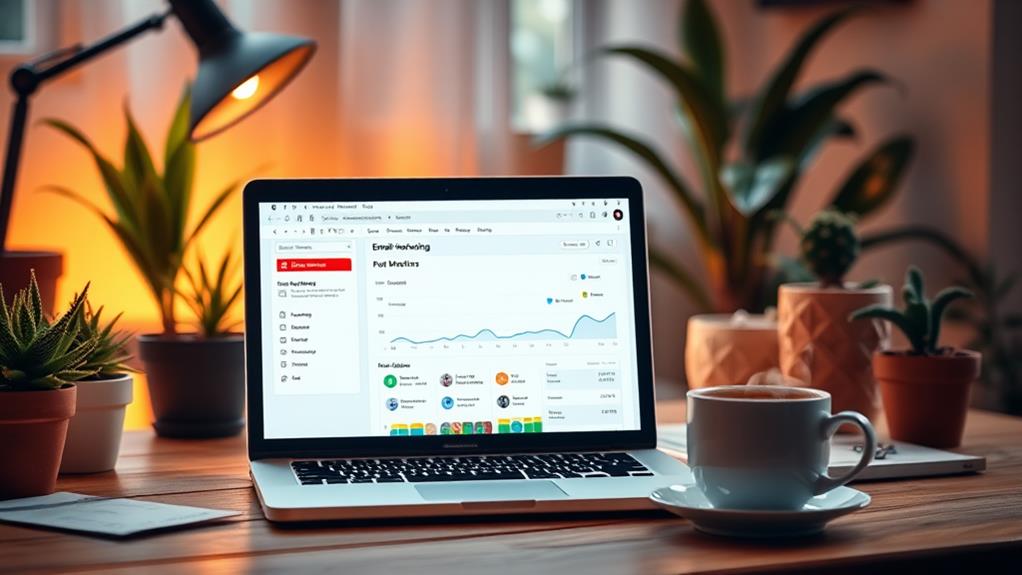In 2024, email marketing continues to be an essential strategy for small businesses, offering a remarkable ROI of $42 for every dollar spent. With 99% of individuals checking email daily, campaigns achieve high visibility. Personalization, such as custom subject lines, can increase open rates by up to 26%. Promotional emails drive 66% of consumers to purchase, while segmentation enhances relevance and can lead to a 760% revenue boost. Email is favored by 73% of millennials, underscoring its effectiveness in building customer relationships. As trends evolve, businesses can explore new opportunities with automated and highly personalized email strategies.
Key Takeaways
- Email marketing offers a high ROI of $42 for every $1 spent, making it cost-effective for small businesses.
- Personalization in emails can boost open rates by 26% and increase sales by 20%, enhancing customer engagement.
- Automated campaigns improve conversion rates by 50% and help in accurate revenue forecasting.
- Email marketing helps build lasting customer relationships, preferred by 73% of millennials, increasing retention rates by 27%.
- Integrating email with social media and SMS, along with mobile optimization, enhances reach and effectiveness.
Understanding Email Marketing
Email marketing's power lies in its ability to deliver targeted messages directly to potential and existing customers, thereby fostering engagement and driving sales for small businesses. At its core, email marketing is anchored in precise email list management, ensuring that communications reach the intended audience effectively.
With 99% of individuals checking their email daily, the channel offers unparalleled visibility for marketing efforts. This high engagement is further evidenced by the impressive return on investment, with each dollar spent yielding an average of $42.
The success of email marketing hinges greatly on understanding and utilizing engagement metrics. By analyzing open rates, click-through rates, and conversion rates, small businesses can gauge the effectiveness of their campaigns and make data-driven decisions to optimize future communications.
Personalization plays a pivotal role in enhancing these metrics; emails with personalized subject lines can see open rates increase by up to 26%, highlighting the importance of tailored content.
Moreover, customer segmentation based on behaviors and preferences allows businesses to deliver more relevant content, driving higher engagement and efficiency. This strategic approach not only bolsters customer relationships but also translates into tangible sales growth, reinforcing email marketing as an essential tool for small business success.
Types of Email Campaigns
In crafting effective email marketing strategies for small businesses, it is essential to understand the distinct objectives and benefits of various email campaign types.
Promotional emails can greatly boost sales, with 66% of consumers making purchases as a result of these targeted offers, while educational content can enhance brand loyalty by delivering valuable information to consumers.
In addition, newsletters, with an average open rate of 20-25%, can sustain ongoing engagement, making them an important tool for keeping your audience informed and connected.
Promotional Email Strategies
Harnessing the power of promotional email strategies is essential for small businesses aiming to enhance their sales performance and customer engagement. Promotional emails, characterized by their focus on directly selling products or services, can greatly boost sales, with 66% of customers making purchases due to these efforts. A well-crafted subject line and compelling email design play vital roles in capturing attention and driving results.
Here's a breakdown of key strategies:
- Incorporate Coupons and Offers: Including these in emails can increase click-through rates by 14% and conversion rates by 10%. Offers create urgency and provide tangible value, encouraging immediate action.
- Utilize Drip Campaigns: These automated sequences nurture leads based on customer behavior. By maintaining consistent engagement through targeted emails, businesses can effectively drive sales and enhance customer loyalty.
- Segment Your Audience: Tailoring emails to specific segments can improve relevance and impact. Segmented campaigns see a 14.32% increase in open rates and a remarkable 100.95% improvement in click rates.
Clear calls-to-action (CTAs) are indispensable in these strategies, boosting click-through rates by 371% and prompting immediate responses.
When executed with precision, promotional email strategies offer small businesses a powerful tool to amplify their market presence and drive revenue.
Educational Content Ideas
While promotional emails are a potent tool for driving sales, integrating educational content into your email campaigns can greatly enhance customer engagement and brand loyalty. Educational emails, such as how-tos and tips, position your brand as a thought leader, thereby increasing trust and credibility. By utilizing content curation, small businesses can deliver relevant and valuable information consistently. This approach not only informs but also empowers subscribers, enhancing their overall experience with your brand.
An effective strategy is to incorporate video tutorials. These can vividly demonstrate product usage or provide expert insights, catering to the visual and auditory preferences of your audience. With video content consumption projected to grow by 82% in 2024, this format is more essential than ever for engaging users.
To further illustrate the impact of educational content, consider the following table showcasing potential benefits:
| Educational Content Type | Benefits |
|---|---|
| How-to Guides | Enhances user knowledge |
| Tips and Tricks | Builds brand authority |
| Content Curation | Provides valuable insights |
| Video Tutorials | Increases engagement rates |
| Industry News | Keeps subscribers informed |
Educational content is instrumental in creating meaningful connections with your audience, ultimately fostering a loyal customer base and driving sustainable growth for small businesses.
Newsletter Engagement Tips
A staggering 74% of marketers affirm the pivotal role of email newsletters in their content strategy, underscoring their effectiveness in maintaining customer engagement.
For small businesses, leveraging the power of newsletters requires strategic planning and execution. Here are key tips to enhance newsletter engagement:
- Craft Compelling Subject Lines: The subject line is the gateway to your content. Data shows that personalized subject lines can improve open rates by 26%. Crafting engaging subject lines that resonate with your audience's interests is essential for capturing their attention.
- Leverage Audience Segmentation: Tailoring content to specific audience segments enhances relevance and engagement. By segmenting your audience based on their past interactions and preferences, you can deliver newsletters filled with content that speaks directly to their needs, thereby increasing click-through rates by up to 50%.
- Diversify Content Types: Incorporating a blend of educational articles, promotional offers, and customer success stories can enhance the value of your newsletters.
Subscribers appreciate diverse content, which fosters higher engagement levels and strengthens brand loyalty.
High Return on Investment
Email marketing stands out as a cost-effective strategy, delivering an impressive average ROI of $42 for every $1 invested, far surpassing many traditional marketing methods.
This channel not only optimizes marketing budgets but also greatly enhances revenue growth potential, as evidenced by 66% of consumers making purchases directly from email campaigns.
Additionally, with automated email campaigns increasing conversion rates by up to 50%, small businesses can efficiently boost their profitability and customer acquisition efforts.
Cost-Effective Strategy
Maximizing the potential of limited marketing budgets is a common challenge for small businesses, and email marketing stands out as a remarkably cost-effective solution. Central to this approach are strategies such as email list building and audience segmentation, which enhance targeting precision and engagement without incurring substantial costs.
The data-driven nature of email marketing guarantees high returns, with studies highlighting an average return on investment (ROI) of $42 for every $1 spent. This impressive figure underscores the efficiency and scalability of email campaigns.
- Lower Customer Acquisition Costs: Compared to traditional methods, email marketing considerably reduces customer acquisition expenses, enabling businesses to optimize their financial resources.
- Purchase Conversion: Approximately 66% of consumers have made purchases directly from an email marketing message, demonstrating its effectiveness in converting leads into sales.
- Time and Cost Efficiency: Automated campaigns not only streamline operations but also enhance conversion rates by nurturing leads and recovering abandoned carts, further emphasizing their economic advantage.
Revenue Growth Potential
Revenue-growth potential in email marketing is highlighted by its remarkable return on investment, with an average ROI of $42 for every $1 spent. This compelling statistic underscores email marketing's efficacy as a strategic tool for small businesses aiming to optimize sales and boost revenue.
With 66% of consumers making purchases due to email promotions, the channel is pivotal in not only attracting potential customers but also in converting them into repeat buyers.
Automated campaigns, such as those targeting abandoned carts, further enhance sales optimization by recovering up to 15% of lost sales. This function serves as a significant driver for revenue forecasting, enabling businesses to project future earnings with greater precision.
Furthermore, segmentation and targeted messaging are critical; businesses employing these strategies experience a staggering 760% increase in revenue. Such data-driven approaches guarantee that the right message reaches the right audience, thereby maximizing conversion rates.
Additionally, the demand for regular promotions is evident, with 49% of customers preferring weekly emails from their favored brands. This consumer behavior offers a consistent avenue for revenue enhancement, solidifying email marketing as an invaluable asset in the toolkit of small businesses.
Personalization and Targeting
While personalization and targeting have long been recognized as pivotal in email marketing, their importance is magnified for small businesses working to enhance customer engagement and drive sales. Through customer segmentation and behavioral targeting, small enterprises can craft messages that resonate with specific audiences, yielding impressive results.
Personalized email subject lines, for instance, can boost open rates by 26%, proving the value of targeted messaging. Additionally, segmenting email lists based on demographics or behavior can lead to a staggering 760% increase in revenue.
The power of personalization is further underscored by consumer behavior: 80% of consumers are more inclined to purchase when brands offer personalized experiences. This highlights the necessity for small businesses to leverage customer data to tailor their communications. Utilizing this data can result in a 20% increase in sales, demonstrating a clear link between targeted messages and revenue growth.
To optimize these strategies, small businesses should consider the following:
- A/B Testing: Experimenting with personalized elements can refine campaigns, improving retention rates by up to 10%.
- Data-Driven Decisions: Use analytics to inform segmentation and targeting strategies.
- Continuous Adjustment: Regularly update customer profiles to maintain relevance.
These methods can greatly enhance the effectiveness of email marketing campaigns.
Building Customer Relationships
In an era where digital communication reigns supreme, email marketing emerges as an essential tool for building robust customer relationships. With 73% of millennials preferring email as their primary communication channel, businesses have a unique opportunity to engage effectively. Consistent email interactions contribute remarkably to customer retention, boosting rates by up to 27% through trust building and fostering customer loyalty. Personalized emails further enhance this dynamic, improving open rates by 26%, allowing businesses to connect with customers on a more personal level.
| Metric | Impact |
|---|---|
| Millennials preferring email | 73% |
| Increase in retention rates | 27% |
| Improvement in open rates | 26% with personalization |
| Increase in customer interactions | 50% through re-engagement emails |
| Return on investment | Up to 5x for relationship-focused companies |
Re-engagement emails are particularly potent, increasing customer interactions by 50%. This targeted communication strategy is a demonstration of the effectiveness of email marketing in maintaining and nurturing relationships. The data is compelling: companies that prioritize customer relationships through email marketing achieve up to five times the return on investment compared to those that do not. Consequently, leveraging email marketing is not merely a tactical choice but a strategic imperative for cultivating enduring customer loyalty and trust.
Future Trends in Email Marketing
As the landscape of digital communication evolves, email marketing is poised to undergo considerable transformations, driven by technological advancements and changing consumer expectations. In 2024, small businesses are expected to leverage several key trends to enhance their marketing strategies.
- Increased Automation: With over 70% of campaigns predicted to incorporate automation tools, small businesses can expect streamlined processes and improved efficiency. Automation tools will enable marketers to send timely, relevant content, fostering better customer engagement.
- Enhanced Personalization: Advanced AI technologies will facilitate hyper-personalization, making emails six times more likely to drive transactions compared to non-personalized counterparts. By utilizing data-driven insights, businesses can tailor content to individual consumer preferences, greatly boosting conversion rates.
- Focus on Data Privacy: As data privacy concerns rise, compliance with regulations such as GDPR will become imperative. By 2024, 80% of businesses will prioritize transparent data practices, ensuring consumer trust and adherence to legal standards.
Moreover, the integration of email with other channels like social media and SMS will become more prevalent, with 60% of marketers aligning their strategies to enhance engagement.
In addition, mobile optimization remains critical, as more than 60% of emails are accessed via mobile devices.
Frequently Asked Questions
Why Is Email Marketing Important in 2024?
In 2024, email marketing remains essential due to its unparalleled return on investment and effectiveness in enhancing customer engagement. Its ability to facilitate personalized digital outreach and leverage mobile optimization guarantees small businesses can maintain competitive advantage and foster relationships.
How Does Email Marketing Help Small Businesses?
Email marketing enhances small businesses by fostering customer engagement through personalized, targeted campaigns. Its cost efficiency, marked by a $42 return on every dollar spent, supports growth by increasing sales, recovering lost revenue, and strengthening customer relationships.
What Are the Key Benefits of Email Marketing?
Email marketing enhances customer engagement and boosts conversion rates by offering a high ROI. With personalized content improving open rates, and automated campaigns recovering abandoned carts, this strategy is essential for driving sales and ensuring business growth.
What Percentage of Emails Are Opened on Mobile in 2024?
In 2024, approximately 50% of emails are opened on mobile devices, underscoring the critical role of mobile engagement in optimizing open rates. This trend necessitates prioritizing mobile-friendly designs to enhance user interaction and reduce unsubscribe rates.
Conclusion
Email marketing remains an essential strategy for small businesses, offering high return on investment and enhanced customer engagement through personalization and targeting. By leveraging various campaign types, businesses can build stronger customer relationships and drive growth. The adaptability of email marketing to evolving trends guarantees its continued relevance in an ever-changing digital landscape. As data increasingly informs marketing strategies, small businesses are well-positioned to harness the power of email marketing to achieve competitive advantages and sustainable success.




